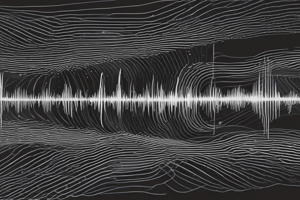Podcast
Questions and Answers
Sound waves can only travel through air and other gases.
Sound waves can only travel through air and other gases.
False (B)
The speed of sound in air is affected by temperature.
The speed of sound in air is affected by temperature.
True (A)
Liquids and solids allow sound waves to travel faster than gases because they are less dense.
Liquids and solids allow sound waves to travel faster than gases because they are less dense.
False (B)
The frequency range of sounds that young humans can hear is the same for all individuals.
The frequency range of sounds that young humans can hear is the same for all individuals.
The decibel scale is linear.
The decibel scale is linear.
What is the speed of sound in dry air at 20 degrees Celsius?
What is the speed of sound in dry air at 20 degrees Celsius?
What is the relationship between sound velocity and the medium it travels through?
What is the relationship between sound velocity and the medium it travels through?
What is the difference in speed of sound between gases and solids/liquids?
What is the difference in speed of sound between gases and solids/liquids?
What is the range of frequencies that young humans are typically capable of detecting?
What is the range of frequencies that young humans are typically capable of detecting?
What is the unit used to measure sound level?
What is the unit used to measure sound level?
What type of waves are sound waves in air?
What type of waves are sound waves in air?
What factor determines the speed of sound waves in air?
What factor determines the speed of sound waves in air?
At what temperature is the speed of sound in dry air at 343 meters per second?
At what temperature is the speed of sound in dry air at 343 meters per second?
Why does sound move faster through solids and liquids than gases?
Why does sound move faster through solids and liquids than gases?
What is the range of frequencies that young humans can typically detect?
What is the range of frequencies that young humans can typically detect?
Flashcards
Sound speed in gases
Sound speed in gases
Sound travels slower through gases compared to liquids and solids.
Sound speed in liquids and solids
Sound speed in liquids and solids
Sound travels faster in liquids and solids than in gases due to higher density.
Sound speed and temperature
Sound speed and temperature
Sound speed in air increases with temperature.
Sound speed in dry air (20°C)
Sound speed in dry air (20°C)
Signup and view all the flashcards
Human hearing range
Human hearing range
Signup and view all the flashcards
Decibel scale
Decibel scale
Signup and view all the flashcards
Sound waves in air
Sound waves in air
Signup and view all the flashcards
Sound velocity and medium
Sound velocity and medium
Signup and view all the flashcards
Sound: Gas vs. Solid/Liquid
Sound: Gas vs. Solid/Liquid
Signup and view all the flashcards
Human hearing range - Young Humans
Human hearing range - Young Humans
Signup and view all the flashcards
Sound wave characteristics
Sound wave characteristics
Signup and view all the flashcards
Sound speed and temperature in air
Sound speed and temperature in air
Signup and view all the flashcards
Decibel - unit of measure
Decibel - unit of measure
Signup and view all the flashcards
Sound speed factors
Sound speed factors
Signup and view all the flashcards
Sound in different media
Sound in different media
Signup and view all the flashcards
Study Notes
Sound Waves and Their Properties
- Sound waves can travel through gases, liquids, and solids, with speed variations depending on the medium.
- Speed of sound in dry air at 20 degrees Celsius is approximately 343 meters per second.
- Temperature significantly influences the speed of sound in air; higher temperatures result in faster sound speed.
Speed of Sound in Different Media
- Sound travels faster in liquids and solids compared to gases due to their higher density and stronger intermolecular forces.
- The sound speed in solids and liquids can be several times higher than that in gases, making them more efficient mediums for sound transmission.
Frequency and Human Hearing
- Young humans can typically detect sound frequencies ranging from about 20 Hz to 20 kHz, although range can vary among individuals.
- Within this range, all young individuals generally exhibit comparable hearing capabilities.
Sound Measurement
- The decibel scale, commonly used to measure sound levels, is logarithmic, indicating that each increase of 10 dB corresponds to a tenfold increase in sound intensity, not linear.
- Sound waves in air are classified as longitudinal waves, where particles oscillate parallel to the direction of wave propagation.
Factors Affecting Sound Speed
- The primary determinant of sound wave speed in air is temperature, with higher temperatures allowing faster particle movement and energy transfer.
Studying That Suits You
Use AI to generate personalized quizzes and flashcards to suit your learning preferences.




